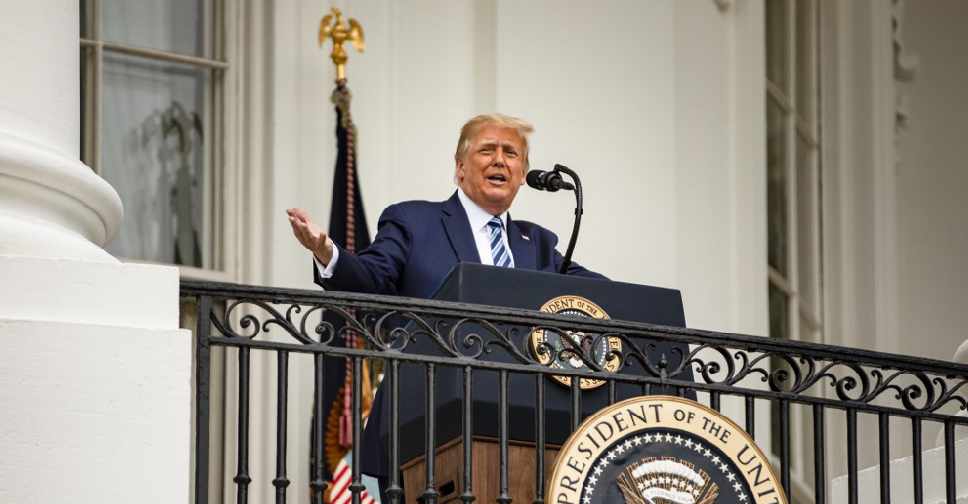
US President Donald Trump appeared back to his old self on Saturday as he addressed supporters at the White House in his first public event since being diagnosed with COVID-19.
Trump took a test on Saturday which showed he was no longer a "transmission risk to others," his physician Sean Conley said in a statement released seven hours after the White House event. The tests showed there was no longer evidence "of actively replicating virus," he added.
The White House had no immediate comment on whether Conley's statement meant Trump had actually tested negative for the coronavirus, which has infected nearly 7.7 million people in the United States and killed over 213,000.
Trump and his administration have faced criticism for their handling of the pandemic, as well as for a lax approach to mask-wearing and social distancing in the White House. At least 11 of his close aides have tested positive for the virus.
Standing alone and not wearing a mask, Trump spoke from a White House balcony on Saturday afternoon - his first public event since being diagnosed with the highly contagious disease. He was hospitalised on October 2 for treatment of COVID-19, and returned to the White House on Monday.
The Republican president, who is trailing Democratic challenger Joe Biden in national polls, urged a crowd of hundreds of largely Black and Latino supporters, most wearing masks but not following social distancing guidelines, to help get out the vote in the Nov. 3 presidential election.
Eager to get back on the campaign trail after an absence of more than a week, Trump plans to travel to the key battleground state of Florida on Monday, followed by rallies in Pennsylvania and Iowa on Tuesday and Wednesday, respectively.
"I'm feeling great," he told the crowd.
Speaking firmly and with no sign of the raspy throat evident in recent interviews, Trump delivered a shorter-than-usual campaign speech.
He attacked Democrats as pursuing a "socialist" or even "Communist" agenda, and hailed his own record in fighting crime and boosting the U.S. economy, while flag-waving supporters cheered and chanted, "We love you."
A flesh-coloured bandage was visible on his right hand.
While Trump's doctor had cleared him to resume public engagements from Saturday, other medical experts said the timeline appeared to be rushed.
Dr. Sandy Nelson, an infectious diseases specialist at Massachusetts General Hospital, said public health guidelines allowed those with mild cases of COVID-19 to resume contacts 10 days after the onset of symptoms and after 24 hours with no fever, without the use of fever-reducing medications.
But for people who were hospitalised and required oxygen, such as Trump, the guidelines generally called for isolation of longer than 10 days and up to 20 days, she said.
"It's fair to say that he’s meeting the time-based criteria, but those criteria are not designed for people who are hospitalized," she told Reuters.
In his statement on Saturday, Conley said the president's tests revealed decreasing viral loads and "decreasing and now undetectable subgenomic mRNA." He provided no further details.



 Israeli attacks on Gaza killed 60 people in 24 hours
Israeli attacks on Gaza killed 60 people in 24 hours
 Trump fires National Security Agency director
Trump fires National Security Agency director
 Israel steps up Syria strikes, says Turkey aims for 'protectorate'
Israel steps up Syria strikes, says Turkey aims for 'protectorate'
 US sending Israel 20,000 assault rifles that Biden delayed
US sending Israel 20,000 assault rifles that Biden delayed



